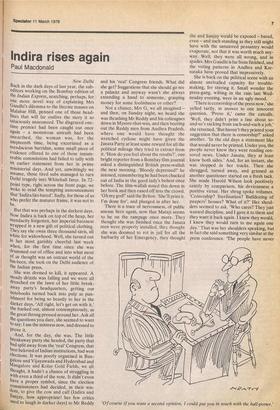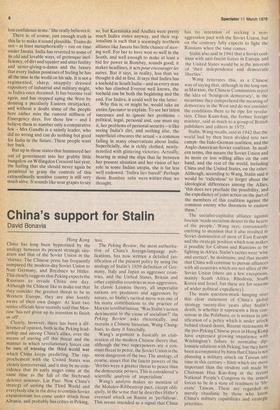Indira rises again
Paul Macdonald
New Delhi Back in the dark days of last year, the subeditors working on the Bombay edition of the Indian Express, searching, perhaps, for one more novel way of explaining Mrs Gandhi's dilemma to the literate masses on Malabar Hill, penned one of those headlines that will far outlive the story it so salaciously announced. The disgraced onetime premier had been caught out once again β a monstrous untruth had been unearthed, the woman was, for the umpteenth time, being excoriated as a Mendacious harridan, some small piece of evidence offered to one of those innumerable commissions had failed to tally with an earlier statement from her in prime ministerial days. And yet, unwittingly we assume, those tired subs managed to turn Delhi tragedy into Whitehall farce. In 72Point type, right across the front page, we woke to read the tempting announcement that 'Indira lies bared'. Sadly, for those of us Who prefer the maturer frame, it was not to be.
But that was perhaps in the darkest days. Now Indira is back on top of the heap, her mendacity forgotten. her imperial bareness wrapped in a new gift of political clothing. They say she owns three thousand saris, all White for widowhood. Well, she turned out in her most garishly cheerful last week When, for the first time since she was drummed out of office and into what most of us thought was an outcast world of the has-been, she took on the Delhi audience of the Indian press.
She was dressed to kill, it appeared. A steady drizzle was falling and we were all drenched on the lawn of her little breakaway party's headquarters, getting our notebooks turned back into pulp as punishment for being so beastly to her in the darker days. 'All right, let's get on with it,' She barked out, almost contemptuously, as the great throng pressed around her. Ask all the questions you dare, she seemed to want to say: I am the mistress now, and dressed to Prove it.
And, for the day, she was. The little breakaway party she headed, the party that had split away from the 'real' Congress, that best beloved of Indian institutions, had won elections. It was poorly organised in Bangalore and Vijayawada and Hyderabad and Mangalore and Kolar Gold Fields, we all thought, it hadn't a chance of struggling in With even a third of the vote. It didn't even have a proper symbol, since the election commissioners had decided, in their wisdom, to give the cow and calf (Indira and Sanjay, how appropriate! her few critics used to laugh in darker days) to Mr Reddy and his 'real' Congress friends. What did she get? Suggestions that she should go see a palmist and anyway wasn't she always extending a hand to someone, grasping money for some foolishness or other?
Not a chance, Mrs G, we all imagined β and then, on Sunday night, we heard she was thrashing Mr Reddy and his colleagues down in Mysore-that-was, and then booting out the Reddy men from Andhra Pradesh, where one would have thought the wretched cyclone might have given the Janata Party at least some reward for all the political mileage they tried to extract from it. 'How do you feel about the results?', one bright reporter from a Bombay film journal asked a distinguished British press-wallah the next morning. 'Bloody depressed!' he intoned, remembering he had been chucked out of India at the good lady's behest once before. The film-wallah noted this down in her book and then eased off into the crowd. 'Oh my god!' said the Briton. 'She'll print it. I'm done for', and plunged in after her.
There is a trace of nervousness, of public unease here again, now that Mataji seems to be on the rampage once more. They thought she was finished once the Janata men were properly installed, they thought she was doomed to rot in jail for all the barbarity of her Emergency, they thought
she and Sanjay would be exposed β bared, even β and such standing as they still might have with the untutored peasantry would evaporate, not that it was worth much anyway. Well; they were all wrong, and in spades. Mrs Gandhi is far from finished, and the voting patterns in Andhra and Karnataka have proved that impressively.
She is back on the political scene with an almost unrivalled capacity for troublemaking, for stirring it. Small wonder the press-gang, wilting in the rain last Weanesday evening, were in an ugly mood.
'There is censorship of the press now,' she yelled tartly, in answer to one innocent question. 'Prove it,' came the catcalls. 'Well, they didn't print a line about soand-so's sacking from such-and-such a job,' she returned. 'But haven't they printed your suggestion that there is censorship?' asked another. 'In the old days a statement like that would never be printed. Under you, the people never knew they were reading censored news. Under Janata, they at least know both sides.' And, for an instant, she was stopped in her tracks. Then she shrugged, turned away, and grinned as another questioner started on a fresh tack. She made Harold Wilson look positively saintly by comparison, his deviousness a positive virtue. Her shrug spoke volumes. 'Censorship? Sterilisation? Bulldozing of paupers' houses? What of it?' Her shoulders seemed to ask. 'Who cares? They just wanted discipline, and I gave it to them and they want it back again. I knew they would, I knew they would turn to me again one day.' That was her shoulders speaking, but in fact she said something very similar at the press conference. 'The people have never lost confidence in me.' She really believes it.
There is, of course, just enough truth in this lie to make it sound plausible. Trains do not β at least metaphorically β run on time under Janata. India has reverted to some of its old and lovable ways, of grotesque inefficiency, of dirt and squalor and utter futility and never-giving-a-damn and the luxury that every Indian possesses of feeling he has all the time in the world on his side. It is not a regimented, sharp, snappily dressed repository of industrial and military might, as Indira once dreamed. It has become real again, and has stopped aping the West by donning a peculiarly Eastern straitjacket, and without a doubt some of the people here rather miss the ramrod stiffness of Emergency days. For those few β and I believe them to number only a comparative few β Mrs Gandhi is a saintly leader, who did no wrong and can do nothing but good for India in the future. These people want her back.
But up in those states that hammered her out of government into her grubby little bungalow on Willingdon Crescent last year, the feeling that she should never again be permitted to grasp the controls of this extraordinarily sensitive country is still very much alive. It sounds like sour grapes to say
so, but Karnataka and Andhra were pretty much Indira states anyway, and their regionalism is such that a seemingly northern alliance like Janata has little chance of scoring well. For her to have won so well in the South, and well enough to make at least a bid for power in Bombay, sounds good, it makes headlines, it acts pour encourager les autres. But it says, in reality, less than we thought it did at first. It says that Indira has a toehold in South India β and as every man who has climbed Everest well knows, the toehold can be both the beginning and the end. For Indira, it could well be the latter.
Why this is, or might be, would take an entire Spectator to explain. To see her latest successes and to ignore her problems β political, legal, personal and, one must say it, her problems of personal security βis like seeing India's dirt, and nothing else, the superficial obscures the actual β a common failing in many observations about India. Superficially, she is richly clothed, newly
mantled with glittering victories. Actually, bearing in mind the slips that lie between her present situation and her vision of her role in some Indian utopia, she is far less well endowed. 'Indira lies bared!' Perhaps those Bombay subs were wittier than we thought.



































 Previous page
Previous page